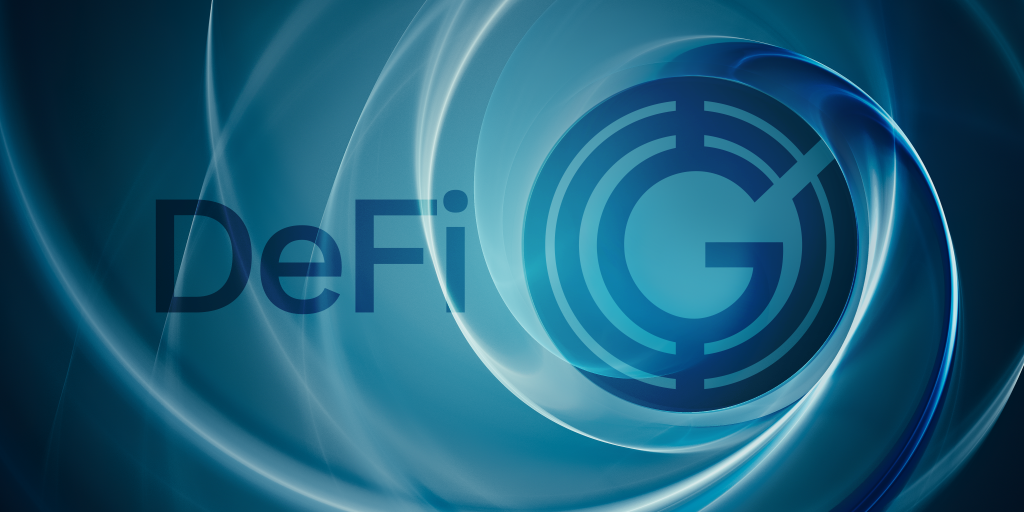By: Geeq on Jun 25, 2020
What Is Decentralized Finance backed by Blockchain?
Decentralized finance (DeFi for short), seems to be taking the crypto world by storm. DeFi began by offering conventional financial tools built on a blockchain, usually on the Ethereum platform. But what does putting DeFi on a blockchain offer over and above traditional finance?
Technological Benefits of Blockchain for DeFi
Firstly it offers more customizability via the Programmability of smart contracts that automate execution and enable the creation of new financial instruments and digital assets.
Secondly, it offers Tamper-resistant data security and auditable coordination across a blockchain’s decentralized architecture that increases trust and transparency for all.
Thirdly it offers Interoperability between blockchains. DeFi protocols and applications are built for specific purposes such as to integrate and complement one another reducing friction and costs. Improving the overall user experience, making it seamless and as efficient as possible.
There are many other benefits the cryptocurrency DeFi community values:
- Instant transaction settlement rather than long waits and administrative hurdles (such as credit checks) to satisfy the traditional banking and financial sectors.
- Unique secured lending methods, including the integration of digital asset lending/borrowing. This is probably the most well-known use of DeFi, where people use their digital assets as collateral to borrow money against their holdings, which is one reason for its popularity: people don’t need to sell their assets in order to raise cash.
- A permissionless system that, by definition, broadens access to people who might not have access to formal financial intermediaries.
- Smart contracts whose terms can be written by developers, replicated, and automated, reducing overall costs.
Major developments in DeFi
Open lending protocols such as MakerDAO rely on the trust minimization of the Ethereum blockchain to reduce counter-party risk, using blockchains’ cryptographic verification methods. DeFi is a very active focus of highly advanced research in cryptography and a large community is interested in how to create new financial instruments and digital assets all based around smart contracts with trust minimization.
Decentralized technology to allow deals and transactions to take place worldwide, without the need for a trusted intermediary or the parties ever to have to meet face to face would expand how blockchain could be incorporated in nearly all aspects of life.
Another use of DeFI is via exchanges and open marketplaces. Many of Geeq’s community are familiar with Decentralized Exchanges like Binance DEX or IDEX. DEXs are P2P exchanges of assets between two parties that take place on the Ethereum Blockchain without a third-party intermediary in a transaction.
DEXs also use some highly innovative methods for swapping tokens such as atomic swaps and other non-custodial means for exchanging one asset for another with minimal settlement time or risk which is great for the end-user as it speeds up the process and keeps costs lower.
There are many other use cases for DeFi that include Know Your Transaction (KYT) & Compliance, DeFi Data and Analytics & Token Utilization, custodians, infrastructure platforms, insurance, and payment avenues to name but a few.
We think every advance in DeFi could benefit from Geeq – and vice versa.
What can Geeq do for DeFi?
DeFi is a decentralised application (dApp) category that can be built directly on the Application layer of Geeq. We know a lot of developers and DeFi supporters who have already been working on the finer points of DeFi smart contracts and markets. As the features of Geeq’s platform and utility token become more widely understood and public, we think DeFi builders AND users will appreciate the scalability, flexibility, security and confidence in a Geeq blockchain, not to mention the low transaction costs and ease of use that come with each instance too.
The beauty of Geeq’s multi-faceted approach is Geeq does not have a single niche like many blockchains. There are a lot of categories of apps Geeq wants to ensure are built, but we are committed to making it easy for multiple communities to flourish at Geeq. The entire point of building a permissionless blockchain ecosystem was to make it scalable without limits with security beyond any other. Geeq’s public blockchains are for everyone, which absolutely includes the DeFi community.
Let’s take Geeq’s characteristics one at a time, in the context of DeFi.
Geeq’s limitless scalability means it is constructed so blockchains and their devs have independence. On Geeq, an enterprise blockchain application can live side-by-side with a DeFi application, while having nothing to do with each other.
The scalability is possible because Geeq does not have a main chain, so there is no shared overhead and, importantly for DeFi, no congestion that spills from one application to another.
Every permissionless application is powered by its own permissionless network and is able to keep its transaction costs as low as possible.
What if a DeFi application is successful beyond its wildest dreams? Again, Geeq’s limitless scalability is designed to accommodate exactly that.
Geeq scales by launching another blockchain with exactly the same code on the Geeq platform. There is no need to increase transaction costs with volume. The entire application scales, validators are paid, and revenue for the application accumulates. Success breeds success!
Geeq’s Proof of Honesty (PoH) provides security throughout the platform. PoH is Geeq’s secret sauce, which enables scalability and, ultimately, in the final build, interoperability between all Geeq blockchains. (To read more, see Geeq’s White Paper and Technical Paper.)
The security for every DeFi blockchain in the ecosystem, and the mechanism for scalability built into the platform, means that DeFi can scale on Geeq without all the problems (including attack vectors) that come when DeFi requires linkages to side or child chains that may be governed or changed by an outside entity.
Geeq’s secure validation layer is untouchable. There are no smart contracts in Geeq’s validation layer because all it does is validate.
There is complete flexibility for devs to build whatever smart contracts they want into DeFi in the application layer of a Geeq blockchain, however. Again, they have control over their own destiny. That means if DeFi Application A chooses to change their terms for a smart contract, that dev group only changes the smart contract for Application A. Devs for DeFi Application B aren’t affected (unless the applications intentionally and explicitly choose to link their terms).
Scalability, independence, flexibility and the option to work together seamlessly and with ease. What more could devs want? There is no limit to how many DeFi applications Geeq’s multi-chain platform can support.
The basic values that DeFi and Geeq share
DeFi is intended to be permissionless and decentralized. So is Geeq! Unless application developers wish to utilise Geeq’s help at inception, once an application is launched, Geeq has absolutely no control over changing the code or altering the ledger. Neither do developers, exchanges, or any other party who might wish to interfere, such as a government. The blockchain runs in the wild, and code is law.
There is a cost to that, of course. Developers who write DeFi applications will need to be very careful about subjecting their application code to extensive quality assurance processes and debugging. However, the timing is right – the DeFi world is well aware, motivated, and has momentum in developing sound products. Geeq, of course, will make testbeds and tools available and is committed to develop right along with developers as their demands grow.
Finally, three fundamental features of Geeq are particularly relevant for reinforcing the spirit of DeFi.
The first is the security Geeq offers. Geeq has always set the bar high because the platform is intended to be the most secure of any permissionless blockchain “for your most valuable transactions”. For tokenized stocks, transfers of real estate, sensitive data – access to provably non-manipulated ledgers are, quite simply, necessary. So too with DeFi – especially if it is intended to appeal to the public at large, who are most likely more risk-averse than the early adopters of DeFi. If security is a concern, we know of no other blockchain protocol that is provably more secure than Proof of Honesty.
The second feature is the stability of the terms of agreement. Proof of Honesty blocks the ability for any community to hard fork an existing Geeq blockchain. If a group of dissatisfied participants no longer like the terms of a DeFi blockchain, they can’t change the terms for anyone else who wants to keep the commitment. There is no way to impose a hard fork by pushing anything called an “upgrade”, and there is no native way for governance (or power) on a blockchain to overrule the minority (unless those terms were built into the application itself and the users had opted in by using it).
The third feature is the unlimited ability to provide choices. If devs or users would like to move to different terms, the entire ecosystem of Geeq is secured such that the Geeq tokens (that users accumulate to pay system fees on Geeq – the equivalent to “gas”) may be used for all Geeq DeFi applications. As devs launch different DeFi applications on Geeq, all they would need to do is announce their new offering and let the users make a choice to utilise them or not.. As smart contracts and financial products become more sophisticated, DeFi on Geeq could be the go-to place for all users, sophisticated or not, to feel safe choosing an offering on Geeq.
DeFi’s mission is to set up a permissionless, secure, expansive and decentralized ecosystem – so is Geeq’s. The motivations of DeFi and Geeq boil down to the same principles: where it is possible to do better than the institutions that exist, including offering access to services for more people, we want to do better.
Conclusion
Geeq believes all participation in the blockchain world should be voluntary, that terms should be transparent and stable, and that decentralization means DeFi smart contracts should execute as promised. Everything about Geeq has been designed to deliver on those principles. The scalability, low costs, flexibility and security Geeq offers to everyone means DeFi can accomplish whatever their imagination can craft, on Geeq.
Feel like Geeq-ing out more on DeFi? Please do!
Geeq’s Value Proposition – DeFi 2







To learn more about Geeq, follow us and join the conversation.
@GeeqOfficial